Text
0 notes
Text
0 notes
Text
"… [Genesis 11] ... This phrase is reserved almost exclusively for the description of ziggurats in Akkadian usage. Additionally, there are some intriguing omens in the series entitled Summa Alu (“If a city …”) that indicate an impending doom that hangs over cities or towers built high. If a city lifts its head to the heaven, it will be abandoned, or there will be a change on the throne. A city that rises like a mountain peak will become a ruin, and if it goes up like a cloud to heaven there will be calamity …"
https://intertextual.bible/t/3502
0 notes
Text
0 notes
Text
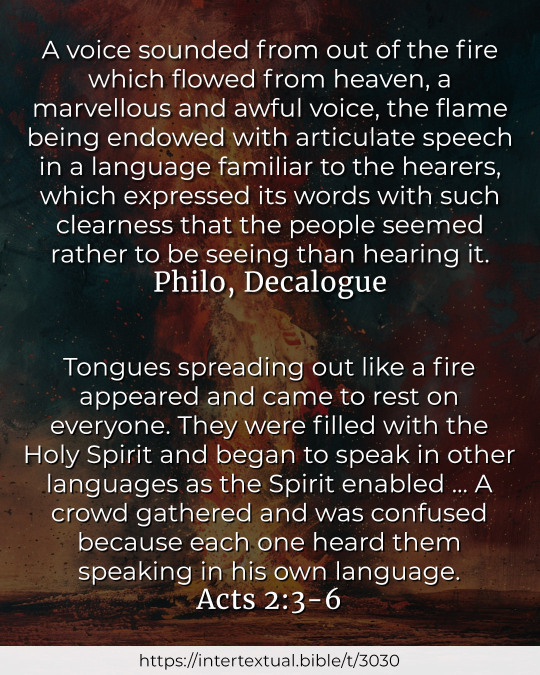
"A voice sounded out of the fire ... the flame being endowed with speech in a language familiar to the hearers" ... does Acts 2 echo Philo's interpretation of the giving of the Torah at Sinai?
#Intertextuality #Classics #NewTestament #Bible
https://intertextual.bible/t/3030
0 notes
Text
"There is, on the contrary, evidence that the Jews after Biblical times adopted fables either from Greece or from India. In Sirach 13:20 there is a distinct reference to the fable of the two pots, which is known in classical antiquity only from Avian (9), though it occurs earlier in Indian sources ('Panchatantrn,' iii. 13, 14). There is a later reference to the same fable in the rabbinic proverb, 'If a jug falls on a stone, woe to the jug! If a stone falls on the jug, woe to the jug!" (Esther Rabbah). For the later spread of Aespoic and Indian fables among the rabbis of the Talmud, see Aesop ..."
https://intertextual.bible/t/367
0 notes
Text
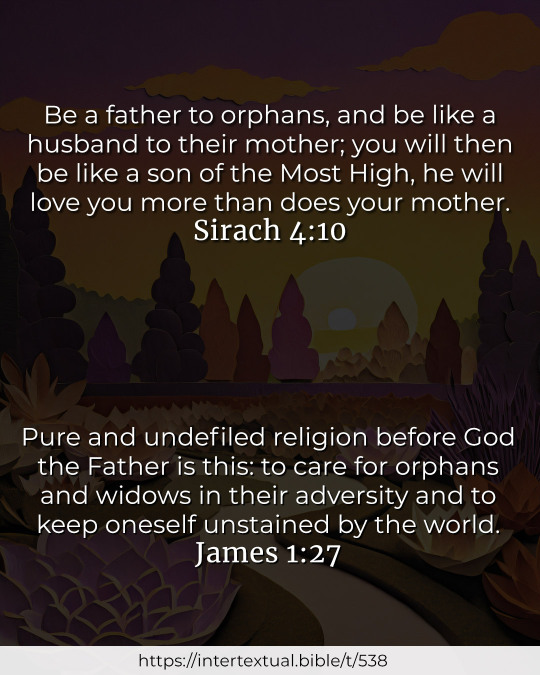
"Be a father to orphans and like a husband to their mother" ... does James echo details of Sirach 4:10?
#Intertextuality #Deuterocanon #NewTestament #Bible
Read more: https://intertextual.bible/t/538
0 notes
Text
Comparing Moses and Josiah
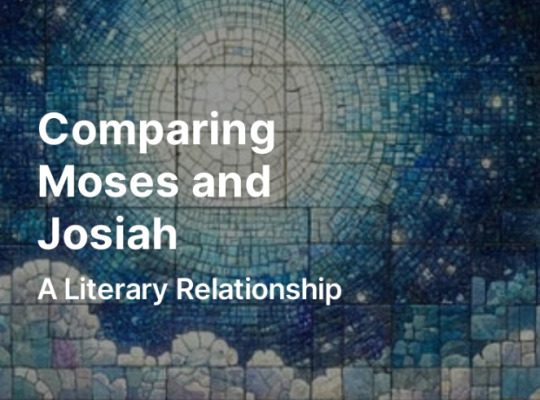
Comparing Moses and Josiah - Intertextual Bible (substack.com)
0 notes
Text
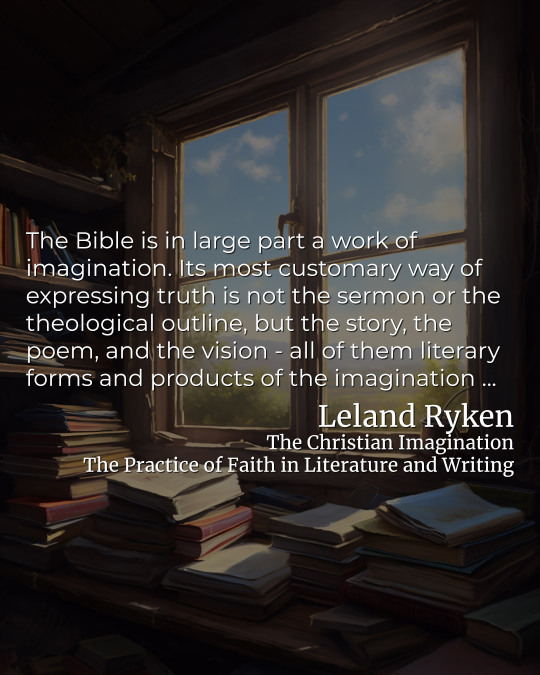
"The Bible is in large part a work of imagination. Its most customary way of expressing truth is not the sermon or the theological outline, but the story, the poem, and the vision - all of them literary forms and products of the imagination."
Leland Ryken
The Christian Imagination: The Practice of Faith in Literature and Writing
0 notes
Text
"Among the many artfully crafted themes in Job's lament in chapter 3, creation stands out. In his suffering Job wants to undo creation. In a reversal, Job declares, "Let there be darkness" ... the language mirrors Genesis 1."
https://intertextual.bible/t/2371
0 notes
Text
"Like gold in the furnace he tried them" ... does 1 Peter draw on imagery found in the Wisdom of Solomon?
#Intertextuality #Deuterocanon #NewTestament #Bible

0 notes
Text
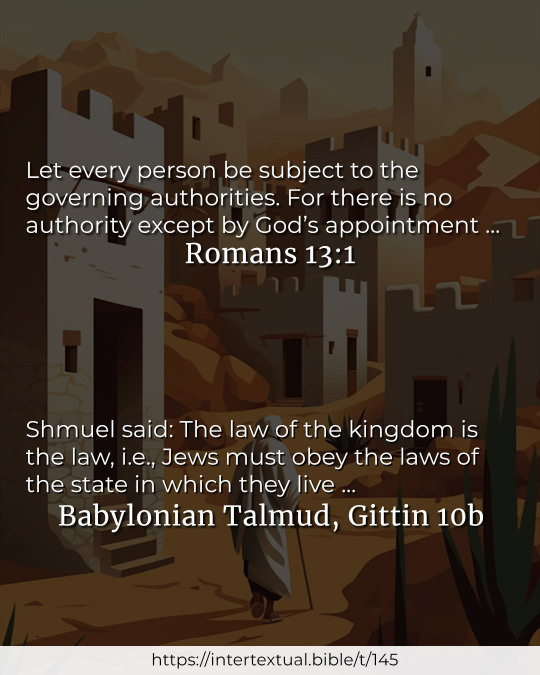
"Let every person be subject to the governing authorities" ... do Romans and tractate Gittin in the Babylonian Talmud echo the same idea of obeying local rulers?
#Intertextuality #NewTestament #Rabbinic #Bible
0 notes
Text
"Jesus’ metaphorical saying about new wine bursting old wineskins coheres with Job 32:19: ‘My heart is like wine that has no vent; like new wineskins, it is ready to burst.’ The Job Targum parallels it even more closely ..." #Intertextuality
intertextual.bible/t/2855
0 notes
Text
"'Blessed are the merciful, for they shall obtain mercy.' How should one understand 'the merciful'? Consider the following examples. The Masoretic text of Psalm 18:25-26 reads: 'with the merciful you show yourself merciful.' In b. Baba Qamma 9:30 there is a nearly identical statement ('So long as you are merciful, He will have mercy on you'). Similar sayings are also found in Sifre Deuteronomy 13:18 and b. Shabbat 151b. Early Christian comments that are similar are found in 1 Clement 13:2 ('Be merciful in order that you might receive mercy') and James 2:13 ('judgment is without mercy to one who has shown no mercy') ..."
Talbert, Charles H. 'Reading the Sermon on the Mount: Character Formation and Decision Making in Matthew 5-7'
Read more: https://intertextual.bible/text/matthew-5.7-shabbat-151b
0 notes
Text
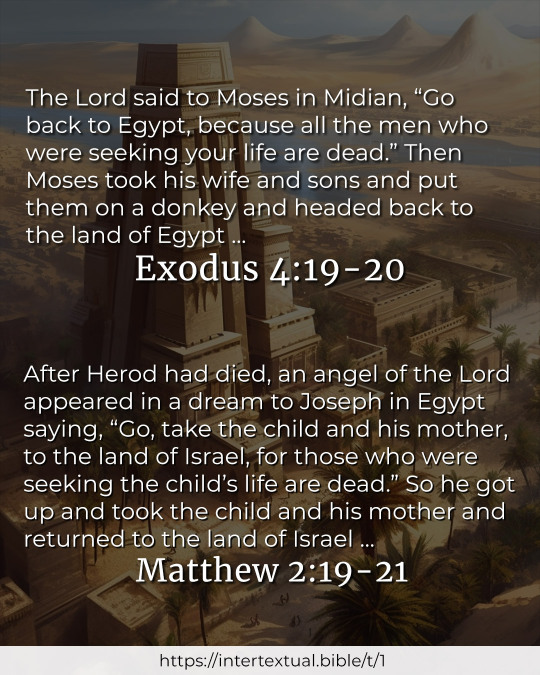
Is Matthew 2 written specifically to echo the narrative and details about Moses from Exodus 4?
Read more: https://intertextual.bible/t/1
1 note
·
View note
